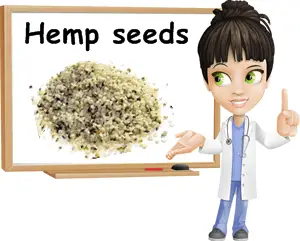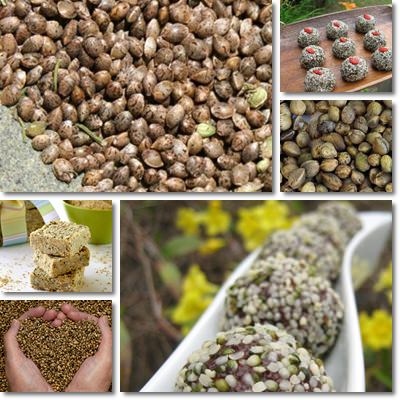Rich in Omega-3 and Omega-6 fatty acids, hemp seeds display a wonderful variety of health benefits. Owing to this, the medical community has come to recommend it as an effective therapy for the treatment of various physical illnesses and mental conditions.
The hemp plant is most popular for its intense psychoactive properties and used extensively for this purpose. As a consequence, its cultivation is regulated by strict norms and its use is forbidden by law, except for medical purposes and under the strict supervision of a medical professional.
If the plant itself can cause such serious side effects, then are hemp seeds and oil safe for consumption? If so, in what way are they so incredibly healthy that they cannot be substituted by any other food? First of all, there are three main varieties of hemp: Cannabis indica, C. sativa and C. ruderalis. All varieties contain various concentrations of several psychoactive compounds, which is why cultivation of the plant is strictly regulated by the law.

THC and CBD in hemp and hemp seeds
THC and CBD are two of the 85 psychoactive compounds found in the plant and are responsible for inducing various mental states such as cerebral stimulation, creativeness, laughter or lethargy, laziness and relaxation, similar to a sedation state. While most of these compounds are found in extremely low concentrations, THC and CBD are contained in such large amounts that they significantly alter normal brain function and consequently behavior, hence their use for pain-relief in inflammatory conditions or terminal diseases and as therapies in mental illness.
The same properties have been found to have great medical applications. For instance, the sedative properties of the plants are used to manage sleep disorders, mental illnesses such as bipolar disorder and ADHD.
The analgesic properties are used for the treatment and management of chronic pain, inflammation and related diseases. However, because of the plant’s effects on the psyche, there are great concerns about long-term use for medicinal purposes.
Yes, extracts of the plant can help manage chemotherapy symptoms, mental illnesses and provide and excellent anesthetic, however, they can also cause one to become dependent on them. It is hard to establish clear boundaries to the use of the plant for medical purposes.
How are hemp seeds different from the rest of the plant?
The flowers, buds or leaves contain psychotropic constituents in greater amounts than the seeds. In addition to this, hemp seeds sold to the general population come from plants especially bred to contain much lower concentrations of these compounds and are thus incapable of altering one’s brain function.

What are the benefits of hemp seeds?
First of all, hemp seeds contain generous amounts of Omega-6 and Omega-3 fatty acids, notably linoleic acid and alpha-linolenic acid. Omega-3 and Omega-6 fatty acids are indispensable for human survival and are especially important for cardiovascular health and normal brain development. Not only do they reduce triglyceride levels, protects blood vessels and lower heart attack risks, but they also delay cognitive degeneration and reduce inflammation.
According to a 2010 article published in Nutrition and Metabolism, the Omega-3 and Omega-6 content of hemp seed oil was extremely beneficial for cardiovascular health. However, when it comes to skin beauty, argan and wheat germ oil provide greater care. Hemp seeds boast a high protein content (33%) as well. If you are leading a vegetarian or vegan lifestyle, they are especially good for you because they substitute, to some extent, the benefits of animal products.
Hemp seeds are extensively used in the form of powder protein food supplements and target bodybuilders as well as weight lifting enthusiasts. Because they boast superior amino acid profiles, hemp seeds are more efficient in building muscle mass and better at repairing damaged muscle.
But you might experience a bit of disappointment when eating hemp seeds for the first time. Truth be told, they are not very palatable. Many people find them hard to chew and even say that eating hemp seeds is like trying to chew on pebbles. And I would have to agree with them. Yes, hemp seeds are nutritious and you will have to gain from eating them on a regular basis. However, so are most seeds and nuts. Sunflower seeds, poppy seeds, sesame seeds and pumpkin seeds are incredibly rich in vitamins, minerals and healthy oils.
More important, they are tastier, easier to chew and boast impressive antioxidant properties. Not to mention they are cheap. Hemp and many nuts and seeds contain impressive amounts of a plant form of Omega-3 called ALA, a source of benefits for both cardiovascular and nervous system health. However, fish and seafood in general are by far the richest sources of Omega-3 fatty acids and contain a superior form called DHA. Even so, having a moderate intake of nuts and seeds comes with wonderful health effects and provides antioxidant, anti-inflammatory, antibacterial and tonic, energizing benefits.
